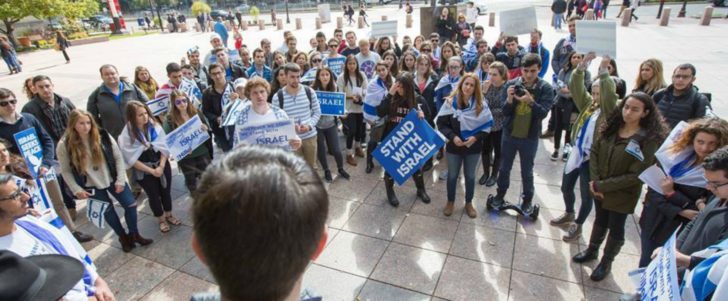Israel’s plan to create a database of all U.S. Jewish college students was sidetracked when it became public. The plan was to be run by a project of Israel’s Diaspora Affairs, whose Minister, Naftali Bennett, is infamous for saying that Israel should kill Palestinian prisoners instead of bringing them to trial. The organization partnered with Hillel and Chabad on a previous project.
Yesterday, Oct. 15, Israel’s Ha’aretz newspaper reported that Israel planned to create a database of all U.S. Jewish college students to use in targeting them for outreach. The next day, Ha’aretz reported that Israel suspended its plan. Below are the two news reports:
Israel to Create Database of All U.S. Jewish College Students for Outreach Efforts
By Judy Maltz, Ha’aretz
The Israeli government is working to set up a database of all Jewish students at universities and colleges in the United States so that it can target them more effectively in its outreach efforts.
The project will be run through Mosaic United, a company set up by the Ministry of Diaspora Affairs several years ago with the declared mission of strengthening the religious identity and connection to Israel of young Jews abroad. Mosaic United intends to outsource the project to an Israeli company that specializes in databases and data mining. It recently published a tender inviting bids.
[Editor’s note: “Mosaic United” was previously named “Government of Israel World Jewry Initiative.” This began in June 2014 with nearly 200 million shekels “for Diaspora programming.”]
“The idea is to set up a database of all Jewish students in the United States (some 350,000 students) and to map daily all the Jewish/Israel events taking place on campuses, along with a daily structural mapping of Jewish/Israeli online content from around the web,” the tender for the project reads.
“The goal is to bring a student not active today in activities connected to Judaism/Israel (roughly 85 percent) to participate in online and local campus activities numerous times and continuously.”
Mosaic United replied to Haaretz’s request for comment with a statement that reads: “The written tender published fails to reflect the essence of the intended project and caused undue confusion. Therefore, Mosaic United is putting the tender on hold, and any further discussion will be based on teh directive of the Steering Committee.”
Members of Mosaic United’s advisory board, however, have been kept in the dark about the initiative, which is almost certain to draw criticism from liberal Jews in the U.S.
Rabbi Avraham Infeld, the former president of Hillel International and a prominent Jewish educator, told Haaretz that he intended to resign from the advisory board over the decision.
“I’m in total shock,” he said. “For some time now, I’ve been contemplating resigning because although I’m a member of the advisory board, nobody there has ever asked for my advice. I was asked to delay my resignation, but now that I have become aware of this new initiative, which no one ever consulted me about and was never discussed in any of our meetings, I can no longer see any reason to delay it.”
According to the tender published by Mosaic United, there are currently 350,000 Jewish students on campuses around the United States, 85 percent of whom have little or no connection to Judaism and Israel. These unaffiliated students will be the target audience of the project.
The job of the company that wins the contract will not only be to create a database of names, but also to divide up the Jewish students into subgroups for micro-targeting purposes.
According to the tender, the company will be assigned with gathering material, both online and offline, that might be of interest or relevant to Jewish students – such as articles, photos and video clips, as well as information about Jewish or Israel-themed events taking place on their campuses. Each subgroup of students will receive a package of material, via social media and other channels, tailored to its specific needs, which will be determined in consultation with Mosaic United.
The payment that the company will ultimately receive will be calculated largely on the basis of the results – that is to say, the increase in the number of Jewish students attending Jewish and Israel-related events on campus and the number of students engaged online with material it distributes.
Mosaic United previously partnered with Hillel & Chabad

Just over a year ago, Mosaic United partnered with three Jewish organizations in a $66 million initiative aimed as strengthening Jewish identity on U.S. college campuses: Chabad, Olami and Hillel International. Unlike Chabad and Olami, Hillel – the largest Jewish campus organization in the world – is not affiliated with any particular stream of Judaism. The company came under fire for teaming up with mainly Orthodox organizations when most Jewish students on U.S. college campuses are non-observant. At the time, Yossi Beilin, a former Israeli minister, resigned in protest from the advisory board of Mosaic United.
[update: “For every dollar Hillel raises for the project, the Israeli government contributes matching funding. Hillel, which prides itself on being a pluralistic Jewish organization, has branches on 550 colleges and universities around the world, primarily in the United States.
“The Diaspora Affairs Ministry has described this campus initiative as its ‘flagship project.’”]
The Ministry of Diaspora Affairs is headed by Naftali Bennett, chairman of the Orthodox, settler-aligned Habayit Hayehudi party. Bennett also serves as minister of education and has been criticized for using the power of his office to promote Orthodox Judaism over other streams.
Mosaic United CEO Amy Holtz stepped down from her position in March, after just a brief period on the job, without providing any explanation. Holtz had previously served as president of Jerusalem U, an organization involved in Jewish outreach and Israel advocacy. Since her resignation, Mosaic United – which the Ministry of Diaspora Affairs crowns its “flagship project” – has been operating without an organizational leader.
After Haaretz Report, Israeli Government Suspends Controversial Plan to Set Up Database of Jewish Students in U.S.
Judy Maltz, Ha’aretz, Oct. 16, 2017
The Israeli government has suspended a plan to create a database of the names of all Jewish college students in the U.S., Haaretz reported. The plan was scuttled after Haaretz released an article detailing the controversial initiative.
The company that was supposed to run the initiative, Mosaic United, is run by Israel’s Ministry of Defense.
Hillel International, the largest Jewish student organization in the world, released a statement saying that Mosaic United had agreed to stop the database plan after hearing Hillel’s concerns.
“We believe the initiative in this tender is not in the best interest of engaging American Jewish college students,” the statement read. “Based on our objections, Mosaic United has agreed to take down the tender from its website and cancel this initiative.”
Mosaic United had initially released a call for bids for the project.
“The idea is to set up a database of all Jewish students in the United States (some 350,000 students) and to map daily all the Jewish/Israel events taking place on campuses, along with a daily structural mapping of Jewish/Israeli online content from around the web,” Mosaic’s website read.
“…Although Hillel announced that Mosaic United has agreed to cancel the project, Mosaic United insisted the project had merely been “frozen.” Asked to explain this discrepancy, sources involved in the project said it would indeed move ahead, but only after the tender had been rewritten in a way that eliminated any controversy.
“There is no doubt that an electronic platform is required in this day and age to reach a young audience,” the sources said. “We just have to figure out a better way of formulating this.”
Jewish student organizations expressed deep concerns over the possibility that their members could potentially find their names on lists created by the Israeli government.
“It smacks of something KGB-like,” said Yosef Tarshish, chairman of the World Union of Jewish Students – an organization that represents Jewish students in 35 countries around the world…..
Open Hillel, a movement of Jewish students out to promote open discourse about Israel on college campuses, issued a statement noting that “Mosaic United’s database confirms what students have been saying for nearly a year – that this project is aimed at surveillance and indoctrination. Hillel must cut ties with Mosaic and answer to students, rather than to Naftali Bennett and the Diaspora Affairs Ministry.”
Professor David Biale, a leader of the newly formed Jewish Studies Activists Network, said Mosaic United could not have chosen a worse time for such an initiative. “With the heightened scrutiny of social media for succumbing to manipulation by Russian hackers during the U.S. election, the initiative, no matter how well-meaning, looks like another form of manipulation,” said Biale, a professor of Jewish history at the University of California, Davis. “Instead of micro-targeting Jewish students, how about investing in intellectually stimulating programming to engage them?”
Mosaic United had initially envisioned a multistage project that would include building a database that included the names of all 350,000 Jewish students in the United States; breaking students down into subgroups according to criteria that would be determined in consultation with the Israeli government; identifying and creating content relevant to Jewish students, including both interactive material (links to articles, photos, video and audio clips) and information about Jewish and Israel-related events taking place on campuses; distributing content customized to the needs and interests of each student – based on his or her profile – over social media and other channels; and formulating criteria for measuring success.
“The goal is to bring a student not active today in activities connected to Judaism/Israel (roughly 85 percent) to participate in online and local campus activities numerous times and continuously,” the tender had stated.
read more:
If you find our news service valuable, please donate here, so that we can continue to inform Americans.





